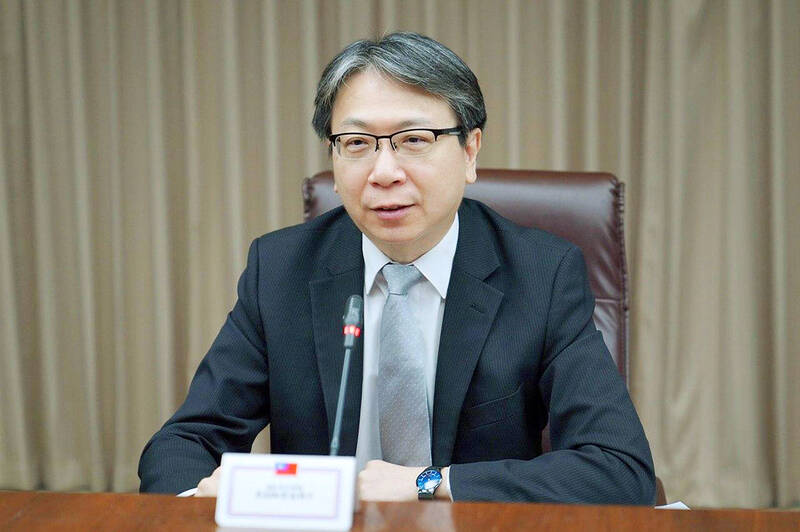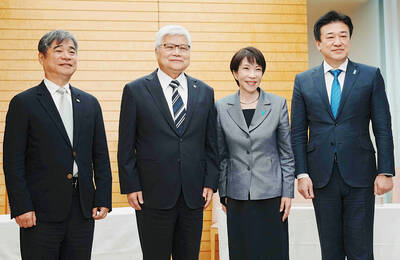Enhancing international security cooperation and combating Chinese infiltration are among the highlights of a policy outline that National Security Bureau Director-General Tsai Ming-yen released (蔡明彥) yesterday.
Tsai released the policy outline on the bureau’s Web site three days after taking the reins of the nation’s principal intelligence agency.
China’s heightened military activities around Taiwan last year were aimed at destabilizing the region and forcing changes to the “status quo,” said Tsai, who was formerly a deputy minister of foreign affairs.

Photo courtesy of the Ministry of Foreign Affairs via CNA
Taiwan must counter these efforts by improving strategic communications with friendly states and deepening integration with the international community, Tsai said.
The bureau’s role is to share information and cooperate with foreign intelligence agencies to protect national security and facilitate the nation’s diplomatic endeavors, he said.
The bureau must improve its intelligence and analytic capabilities regarding China to provide the government with reliable policymaking information and to predict when dangers might arise, Tsai said.
Taiwan’s counterintelligence abilities, especially in detection of security breaches, should be bolstered to combat Beijing’s efforts to infiltrate government, military and civil society bodies, he said.
The bureau is continuing efforts to integrate national security resources to counter China’s cognitive warfare, Tsai said, adding that the government is ensuring that freedom of speech and national laws are protected in the process.
The security and integrity of national elections must also be protected by planning for possible outside interference and arranging for the personal security of candidates, he added.
The bureau is to oversee efforts to integrate technology into its intelligence and counterintelligence capabilities, and supervise the creation of a zero-trust security architecture, Tsai said.
Data networks must be bolstered against attacks with the addition of mobile backup sites, system recovery mechanisms and uninterrupted encryption services, he said.
A national security system should continuously monitor for threats that are logged on a database with the capability of filtering, analyzing and tracking risk factors, he added.
Information derived from such a source should be shared with law enforcement to enact preventive measures before threats are realized, he said.

Right-wing political scientist Laura Fernandez on Sunday won Costa Rica’s presidential election by a landslide, after promising to crack down on rising violence linked to the cocaine trade. Fernandez’s nearest rival, economist Alvaro Ramos, conceded defeat as results showed the ruling party far exceeding the threshold of 40 percent needed to avoid a runoff. With 94 percent of polling stations counted, the political heir of outgoing Costa Rican President Rodrigo Chaves had captured 48.3 percent of the vote compared with Ramos’ 33.4 percent, the Supreme Electoral Tribunal said. As soon as the first results were announced, members of Fernandez’s Sovereign People’s Party

EMERGING FIELDS: The Chinese president said that the two countries would explore cooperation in green technology, the digital economy and artificial intelligence Chinese President Xi Jinping (習近平) yesterday called for an “equal and orderly multipolar world” in the face of “unilateral bullying,” in an apparent jab at the US. Xi was speaking during talks in Beijing with Uruguayan President Yamandu Orsi, the first South American leader to visit China since US special forces captured then-Venezuelan president Nicolas Maduro last month — an operation that Beijing condemned as a violation of sovereignty. Orsi follows a slew of leaders to have visited China seeking to boost ties with the world’s second-largest economy to hedge against US President Donald Trump’s increasingly unpredictable administration. “The international situation is fraught

Taiwan Semiconductor Manufacturing Co (TSMC, 台積電) plans to make advanced 3-nanometer chips in Japan, stepping up its semiconductor manufacturing roadmap in the country in a triumph for Japanese Prime Minister Sanae Takaichi’s technology ambitions. TSMC is to adopt cutting-edge technology for its second wafer fab in Kumamoto, company chairman C.C. Wei (魏哲家) said yesterday. That is an upgrade from an original blueprint to produce 7-nanometer chips by late next year, people familiar with the matter said. TSMC began mass production at its first plant in Japan’s Kumamoto in late 2024. Its second fab, which is still under construction, was originally focused on

GROWING AMBITIONS: The scale and tempo of the operations show that the Strait has become the core theater for China to expand its security interests, the report said Chinese military aircraft incursions around Taiwan have surged nearly 15-fold over the past five years, according to a report released yesterday by the Democratic Progressive Party’s (DPP) Department of China Affairs. Sorties in the Taiwan Strait were previously irregular, totaling 380 in 2020, but have since evolved into routine operations, the report showed. “This demonstrates that the Taiwan Strait has become both the starting point and testing ground for Beijing’s expansionist ambitions,” it said. Driven by military expansionism, China is systematically pursuing actions aimed at altering the regional “status quo,” the department said, adding that Taiwan represents the most critical link in China’s